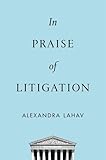In praise of litigation / Alexandra Lahav.
Publication details: London: Oxford University Press, 2017.Description: xiv, 214 pISBN:- 9780199380800
- 347.735 Q7
| Item type | Current library | Call number | Status | Date due | Barcode | Item holds |
|---|---|---|---|---|---|---|
 Books
Books
|
Mahatma Gandhi University Library General Stacks | 347.735 Q7 (Browse shelf(Opens below)) | Available | 59832 |
Includes bibliographical references and index.
Machine generated contents note: Preface; Acknowledgments; Introduction: A Force for Democracy -- Chapter 1 Enforcing the Law -- Chapter 2 The Power of Information -- Chapter 3 Participation in Self-Government -- Chapter 4 Equality Before the Law -- Epilogue.
It is not difficult to find critics of America's famously litigious society. We have more lawyers per capita than anywhere else. Critics say we are unmatched in our willingness to sue, pointing to anecdotes of frivolous suits such as a man who sued his drycleaner over a pair of pants or parents who sued a school when their son broke his leg going down a slide head first. The critics contend that the primary beneficiaries of litigation are attorneys themselves, and that the main effect of excessive litigiousness is reduced business innovation. The tort reform movement that they champion-dedicated to limiting the reach of lawsuits and in some cases eliminating certain types of suits altogether-has become a powerful force in America politics and law. The tort reform movement has had some real successes in limiting what can reach the courts, but there have been victims too. As Alexandra Lahav shows, it has become increasingly difficult for ordinary people to enforce their rights. In the grand scale of lawsuits, actually crazy or bogus lawsuits constitute a tiny minority ; in fact, most anecdotes turn out to be misrepresentations of what actually happened. In In Praise of Litigation, Lahav argues that critics are blinded to the many benefits of lawsuits. The majority of lawsuits promote equality before the law, transparency, and accountability. Our ability to go to court is a sign of our strength as a society and enables us to both participate in and reinforce the rule of law. In addition, joining lawsuits gives citizens direct access to governmental officials-judges-who can hear their arguments about issues central to our democracy, including the proper extent of police power and the ability of all people to vote. It is at least arguable that lawsuits have helped spur major social changes in arenas like race relations and marriage rights, as well as made products safer and forced wrongdoers to answer for their conduct. In this defense, Lahav does not ignore the obvious drawbacks to litigiousness. It is expensive, stressful, and time consuming. Certainly, sensible reforms could make the system better. However, many of the proposals that have been adopted and are currently on the table seek only to solve problems that do not exist or to make it harder for citizens to defend their rights and to enforce the law. This is not the answer. In Praise of Litigation offers a level-headed and law-based assessment of the state of litigation in America as well as a number of practical steps that can be taken to ensure citizens have the right to defend themselves against wrongs while not odiously infringing on the rights of others. "--
Does litigation provide any social benefits at all? Certainly, it is expensive, stressful and time consuming, but Alexandra Lahav contends that the critics have blinded us to its many benefits. In Praise of Litigation explains what society gains from litigation and why it is ultimately a social good. Our ability to go to court is a sign of our strength as a society and enables us to both participate in and reinforce the rule of law. Joining lawsuits also gives citizens direct access to governmental officials - judges - who can hear their arguments about issues central to our democracy, such as the extent of police power and the ability of all people to vote. Litigation also promotes equality before the law, transparency, and accountability. And it is at least arguable that lawsuits have helped spur major social changes in arenas like race relations and marriage rights, as well as made products safer and forced wrongdoers to answer for their conduct. In her defense of the system, Lahav does not ignore the many costs that litigation imposes, and proposes a number of sensible reforms that improve the value of litigation. Many of the proposals that have been adopted and are currently on the table are spurious because they solve problems that do not exist or just make it harder for citizens to defend their rights and to enforce the law --


There are no comments on this title.